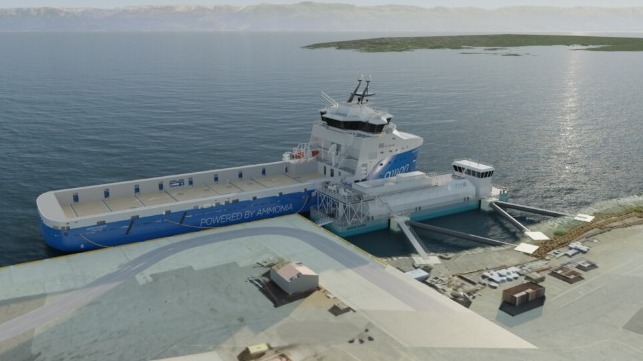Norway Grants Safety Permits to Build First Ammonia Bunkering Terminal

The Norwegian Directorate for Civil Protection gave its approval for the construction of the planned ammonia bunkering facility at Fjord Base in Florø, Norway. The permit marks a significant milestone as it is the first permit for the building of an ammonia bunkering facility, coming just after a project in Singapore reported the first-ever bunkering of ammonia as a marine fuel and test aboard a vessel.
Yara Clean Ammonia and startup Azane Fuel Solutions launched their efforts two years ago in 2022 to develop the first network of ammonia bunkering stations planned for Scandinavia. According to the companies, the permit demonstrated how the planned ammonia bunkering terminal can meet the strict safety requirement of the Norwegian Directorate for Civil Protection (DSB).
Work with Fjord Base, operators of the largest offshore supply base for the oil and gas sector located in Florø, Norway, the planned terminal consists of a floating stationary barge with a capacity of 1000 cubic meters, or 650 tons, of ammonia. The permit allows for up to 416 operations annually, many of these expected to be bunkering operations for offshore supply vessels that regularly call at Fjord Base in Florø.
“Now we finally know with certainty the safety zones we will have to operate under when bunkering ammonia,” said Steinar Kostøl, VP Projects & Products for Azane. The required safety zones are very encouraging and demonstrate how it will be possible to bunker ammonia in the biggest and busiest ports around the world.”
Yara Clean Ammonia, Azane, and Fjord Base report they will now commence work with their project partners to obtain a permit with the local municipality. They look to complete this next step before a final investment decision on the first project.
The companies plan to develop a network of terminals in Scandinavia to meet the anticipated demand for ammonia as a marine fuel. They point to the early orders for ammonia-ready vessels as engine manufacturers work to complete the modifications to their engines and designs for the fuel supply system to commercialize ammonia-fueled propulsion. They also highlight that ENOVA, which operates the Norwegian Government’s Climate and Energy Fund to accelerate the development of new energy technologies, is planning a new round of ammonia grant tenders for ammonia-powered ships and ammonia infrastructure in 2024.
The Maritime and Port Authority of Singapore working with partners including DNV and fuel supplier Vopak started in October 2023 to complete testing and training to support the first ammonia bunkering operation. An initial load of three tonnes of liquid ammonia was loaded from Vopak’s Banyan Terminal on Jurong Island in Singapore on a demonstration vessel, an OSV converted by Australia’s Fortescue Group.
The tests were carried out with the Fortescue Green Pioneer, a 3,100 dwt vessel built in 2010 and converted in 2023 to be able to operate on ammonia. According to the MPA, the fuel trial was conducted over a period of seven weeks and included rigorous testing of the vessel’s storage systems for ammonia, as well as the associated piping, gas fuel delivery system, retrofitted engines, and overall seaworthiness. A second bunkering of a further three tonnes of liquid ammonia will be loaded for the Fortescue Green Pioneer in the next few weeks. Further tests and trials are planned as the validation process continues.
No comments:
Post a Comment